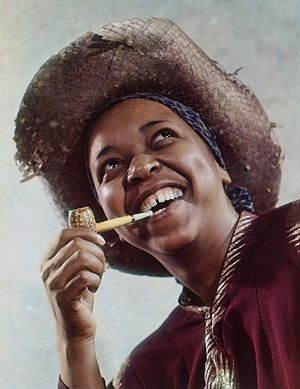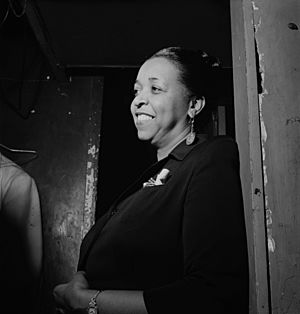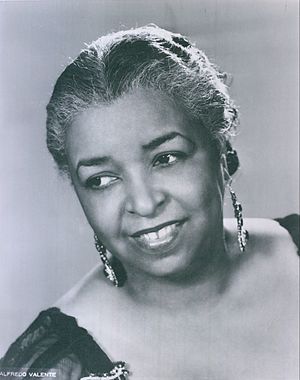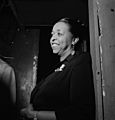Ethel Waters facts for kids
Quick facts for kids
Ethel Waters
|
|
|---|---|
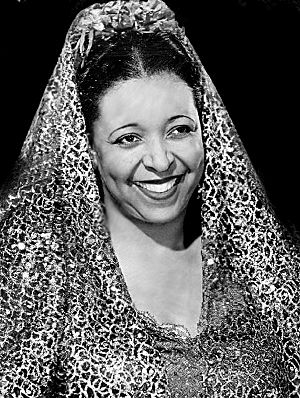
Waters in Cabin in the Sky, 1943
|
|
| Born | October 31, 1896 Chester, Pennsylvania, U.S.
|
| Died | September 1, 1977 (aged 80) Chatsworth, California, U.S.
|
| Resting place | Forest Lawn Memorial Park, Glendale, California, U.S. |
| Other names |
|
| Occupation |
|
| Years active | 1917–1977 |
| Spouse(s) |
Merritt Purnsley
(m. 1910; div. 1913)Clyde E. Matthews
(m. 1929; div. 1933)Edward Mallory
(m. 1938; div. 1945) |
| Relatives | Crystal Waters (great-niece) |
| Musical career | |
| Genres | |
| Instruments | Vocals |
| Labels |
|
Ethel Waters (born October 31, 1896 – died September 1, 1977) was a famous American singer and actress. She sang jazz, swing, and pop music on the Broadway stage and in concerts. Ethel started her career in the 1920s by singing blues.
Some of her most well-known songs include "Dinah", "Stormy Weather", "Taking a Chance on Love", and "Cabin in the Sky". She also sang her own version of "His Eye Is on the Sparrow".
Ethel Waters achieved many "firsts" for African Americans. She was the second African American to be nominated for an Academy Award. She was also the first African American to star in her own television show. Plus, she was the first African-American woman to be nominated for a Primetime Emmy Award.
Contents
Early life
Ethel Waters was born in Chester, Pennsylvania, on October 31, 1896. Her mother was Louise Anderson. Her father was John Wesley Waters, a pianist. Ethel's father did not help raise her.
Soon after Ethel was born, her mother married Norman Howard. They had a daughter named Juanita, who was Ethel's half-sister. Ethel used the last name Howard as a child. Later, she went back to using Waters.
Ethel grew up in poverty. Her grandmother, Sally Anderson, raised her. She also lived with two aunts and an uncle. Ethel never stayed in one place for long. She once said about her childhood, "I never was a child. I never was cuddled, liked, or understood by my family."
Ethel grew to be quite tall, about 5 feet 9.5 inches as a teenager. Because she moved around a lot, she experienced many different cultures.
When she was 13, Ethel got married in 1909. But she soon left her family. She became a maid in a Philadelphia hotel, earning $4.75 a week.
On her 17th birthday, she went to a party at a nightclub. People there convinced her to sing two songs. She impressed everyone so much that she was offered a job. This was at the Lincoln Theatre in Baltimore. She earned $10 a week, which was a lot of money then. However, her managers sometimes kept the tips she received.
Career
Singing career beginnings
After starting in Baltimore, Ethel Waters toured the black vaudeville circuit. She described it as working "from nine until unconscious." Despite her early success, she faced tough times. She even joined a carnival, traveling in freight cars to Chicago.
She enjoyed her time with the carnival. She said the people were "rough, tough... but sentimental and loyal." But she didn't stay long. She soon went south to Atlanta. There, she worked in the same club as Bessie Smith. Bessie Smith was a famous blues singer. She asked Ethel not to sing blues songs against her. So, Ethel sang ballads and popular songs instead. Around 1919, Ethel moved to Harlem. She became a performer during the Harlem Renaissance of the 1920s.
Her first job in Harlem was at Edmond's Cellar. This club was popular with black customers. It was known for popular ballads. She also acted in a comedy show called Hello 1919. By 1921, women blues singers were very popular entertainers.
In 1921, Ethel Waters became one of the first black women to make a record. She recorded for a small company called Cardinal Records. Later, she joined Black Swan. Fletcher Henderson played piano for her there. Ethel felt that Henderson's style was too classical for her taste.
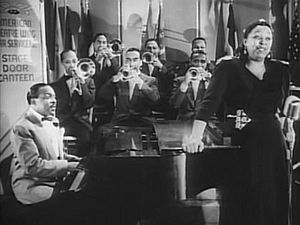
She recorded for Black Swan from 1921 to 1923. Her contract made her the highest-paid black recording artist at that time. In early 1924, Paramount bought Black Swan. Ethel continued to record with Paramount for the rest of that year.
Around this time, Ethel was asked to perform in London. It was for a show called Plantation Days. She later joined the show when it returned to Chicago in August 1923. She was an "extra added attraction" to help the show.
She started working with Pearl Wright, and they toured in the South. In 1924, Ethel performed at the Plantation Club on Broadway. She also toured with the Black Swan Dance Masters.
She first recorded for Columbia in 1925. She had a big hit with the song "Dinah".
Ethel and Earl Dancer joined the "white time" Keith Vaudeville Circuit. This was a vaudeville tour for white audiences. It also included silent movie screenings. They received great reviews in Chicago. They earned a huge salary of US$1,250 in 1928. In September 1926, Waters recorded "I'm Coming Virginia". This song was written by Donald Heywood and Will Marion Cook. The next year, Ethel sang it in a Broadway show called Africana. In 1929, Ethel and Wright arranged the song "Am I Blue?". It was used in the movie On with the Show. This song became a big hit and one of her most famous songs.
Film, theater, and television
In 1933, Ethel Waters appeared in a movie called Rufus Jones for President. This movie was a comedy with an all-black cast. It featured a young Sammy Davis Jr. as Rufus Jones.
She then starred at the Cotton Club. There, she sang "Stormy Weather". She said she sang it from a very difficult time in her life. In 1933, she had a major role in the successful Broadway musical As Thousands Cheer. She performed with stars like Clifton Webb and Marilyn Miller.
Ethel became the first black woman to perform in Broadway's main theater district. This was more than ten years after actor Charles Sidney Gilpin performed in plays by Eugene O'Neill.
Ethel Waters had three jobs at once. She was in As Thousands Cheer, sang for Jack Denny & His Orchestra on the radio, and performed in nightclubs. She became the highest-paid performer on Broadway.
Despite her success, she sometimes found it hard to get work. She moved to Los Angeles to be in the 1942 film Cairo. That same year, she played her famous stage role as Petunia in the all-black musical film Cabin in the Sky. Vincente Minnelli directed the movie. Lena Horne also starred in it. Ethel sang the song "Happiness is Just a Thing Called Joe", which was nominated for an Academy Award.
In 1939, Ethel Waters made history again. She became the first African American to star in her own television show. This was before Nat King Cole's show in 1956. The Ethel Waters Show was a special variety show. It aired on NBC on June 14, 1939. It included a dramatic performance from the Broadway play Mamba's Daughters. This play was about the Gullah community in South Carolina.
Ethel was nominated for an Academy Award for Best Supporting Actress for the film Pinky (1949). The director was Elia Kazan. The first director, John Ford, left the film because of disagreements with Ethel.
In 1950, she won the New York Drama Critics Circle Award. This was for her performance with Julie Harris in the play The Member of the Wedding. Ethel and Julie Harris played their roles again in the 1952 movie version.
In 1950, Ethel Waters became the first African-American actress to star in a TV series. It was called Beulah. It aired on ABC from 1950 to 1952. It was the first weekly TV series broadcast across the country with an African American in the main role. Ethel played Beulah for the first year. She left in 1951, saying the show's portrayal of black people was "degrading." Louise Beavers took over her role. Ethel also made guest appearances on NBC's The Ford Show, Starring Tennessee Ernie Ford in 1957 and 1959. In 1957, she sang "Cabin in the Sky" on the show.
Personal life
Ethel Waters wrote her first autobiography, His Eye Is on the Sparrow, in 1951. It was written with Charles Samuels. This book was later turned into a stage play.
In 1953, she appeared in a Broadway show called At Home With Ethel Waters.
Ethel Waters was married three times and did not have any children. Her first marriage was to Merritt "Buddy" Purnsley in 1909. They divorced in 1913. She married Clyde Edwards Matthews in 1929, and they divorced in 1933. Her third marriage was to Edward Mallory in 1938, and they divorced in 1945. The singer-songwriter Crystal Waters is Ethel's great-niece.
In 1938, Ethel met the artist Luigi Lucioni. He asked to paint her portrait. Ethel bought the finished painting from him in 1939 for $500. This was when she was at the peak of her career. The painting was thought to be lost for many years. But it was found and displayed at the Huntsville Museum of Art in 2016. The museum bought the painting in 2017.
A big change happened in Ethel's life in 1957. She attended a Billy Graham Crusade in Madison Square Garden. Years later, she shared her experience. She said she rededicated her life to Jesus Christ that night. In her later years, Ethel often toured with the preacher Billy Graham. She was a baptized Catholic and remained so throughout her life.
Ethel Waters passed away on September 1, 1977, at the age of 80. She died in Chatsworth, California, due to health issues. She is buried at Forest Lawn Memorial Park (Glendale).
A one-woman show called Ethel was written and performed by Terry Burrell. It was a tribute to Ethel Waters. It ran in February and March 2012.
Awards and honors
Ethel Waters received many awards and honors for her amazing work:
- Her recording of "Stormy Weather" (1933) was added to the National Recording Registry in 2003. This registry keeps important recordings safe.
- She was inducted into the Gospel Music Hall of Fame in 1983.
- She was also inducted into the Christian Music Hall of Fame in 2007.
- In 2004, she was approved for a star on the Hollywood Walk of Fame. However, the star was never put in place.
- In 2015, a historical marker was placed in Chester, Pennsylvania. This marker honors Ethel Waters in her hometown.
- The U.S. Post Office released a commemorative stamp in her honor in 1994.
- She was nominated for Best Supporting Actress at the Academy Awards for the film Pinky in 1949.
- She was nominated for an Outstanding Single Performance by an Actress in a Series at the Primetime Emmy Awards. This was for her role in Route 66 in 1962.
- Three of her recordings were inducted into the Grammy Hall of Fame. This award honors recordings that are at least 25 years old and have special meaning.
| Year | Title | Genre | Label | Year inducted |
|---|---|---|---|---|
| 1929 | "Am I Blue?" | Traditional Pop (Single) | Columbia | 2007 |
| 1933 | "Stormy Weather" (Keeps Rainin' All The Time) |
Jazz (Single) | Brunswick | 2003 |
| 1925 | "Dinah" | Traditional Pop (Single) | Columbia | 1998 |
Images for kids
See also
 In Spanish: Ethel Waters para niños
In Spanish: Ethel Waters para niños
 | Selma Burke |
 | Pauline Powell Burns |
 | Frederick J. Brown |
 | Robert Blackburn |


